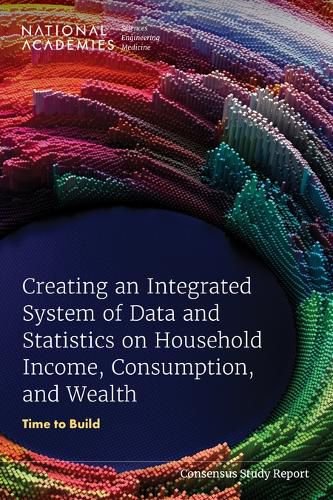Readings Newsletter
Become a Readings Member to make your shopping experience even easier.
Sign in or sign up for free!
You’re not far away from qualifying for FREE standard shipping within Australia
You’ve qualified for FREE standard shipping within Australia
The cart is loading…






Many federal agencies provide data and statistics on inequality and related aspects of household income, consumption, and wealth (ICW). However, because the information provided by these agencies is often produced using different concepts, underlying data, and methods, the resulting estimates of poverty, inequality, mean and median household income, consumption, and wealth, as well as other statistics, do not always tell a consistent or easily interpretable story. Measures also differ in their accuracy, timeliness, and relevance so that it is difficult to address such questions as the effects of the Great Recession on household finances or of the Covid-19 pandemic and the ensuing relief efforts on household income and consumption. The presence of multiple, sometimes conflicting statistics at best muddies the waters of policy debates and, at worst, enable advocates with different policy perspectives to cherry-pick their preferred set of estimates. Achieving an integrated system of relevant, high-quality, and transparent household ICW data and statistics should go far to reduce disagreement about who has how much, and from what sources. Further, such data are essential to advance research on economic wellbeing and to ensure that policies are well targeted to achieve societal goals.
Creating an Integrated System of Data and Statistics on Household Income, Consumption, and Wealth reviews the major household ICW statistics currently produced by U.S. statistical agencies and provides guidance for modernizing the information to better inform policy and research, such as understanding trends in inequality and mobility. This report provides recommendations for developing an improved 21st century data system for measuring the extent to which economic prosperity is shared by households throughout the population and for understanding how the distribution of resources is affected by government policy and economic events.
Table of Contents
Front Matter Summary 1 Introduction and Overview 2 Definitions and Conceptual Issues 3 Statistics for Policy and Public Understanding 4 Data Requirements and Criteria 5 Data Solutions, Methods, and Options 6 Governance, Legal, and Privacy Issues Appendix A: List of Conclusions and Recommendations Appendix B: Committee Biographies References Committee on National Statistics
$9.00 standard shipping within Australia
FREE standard shipping within Australia for orders over $100.00
Express & International shipping calculated at checkout
Many federal agencies provide data and statistics on inequality and related aspects of household income, consumption, and wealth (ICW). However, because the information provided by these agencies is often produced using different concepts, underlying data, and methods, the resulting estimates of poverty, inequality, mean and median household income, consumption, and wealth, as well as other statistics, do not always tell a consistent or easily interpretable story. Measures also differ in their accuracy, timeliness, and relevance so that it is difficult to address such questions as the effects of the Great Recession on household finances or of the Covid-19 pandemic and the ensuing relief efforts on household income and consumption. The presence of multiple, sometimes conflicting statistics at best muddies the waters of policy debates and, at worst, enable advocates with different policy perspectives to cherry-pick their preferred set of estimates. Achieving an integrated system of relevant, high-quality, and transparent household ICW data and statistics should go far to reduce disagreement about who has how much, and from what sources. Further, such data are essential to advance research on economic wellbeing and to ensure that policies are well targeted to achieve societal goals.
Creating an Integrated System of Data and Statistics on Household Income, Consumption, and Wealth reviews the major household ICW statistics currently produced by U.S. statistical agencies and provides guidance for modernizing the information to better inform policy and research, such as understanding trends in inequality and mobility. This report provides recommendations for developing an improved 21st century data system for measuring the extent to which economic prosperity is shared by households throughout the population and for understanding how the distribution of resources is affected by government policy and economic events.
Table of Contents
Front Matter Summary 1 Introduction and Overview 2 Definitions and Conceptual Issues 3 Statistics for Policy and Public Understanding 4 Data Requirements and Criteria 5 Data Solutions, Methods, and Options 6 Governance, Legal, and Privacy Issues Appendix A: List of Conclusions and Recommendations Appendix B: Committee Biographies References Committee on National Statistics